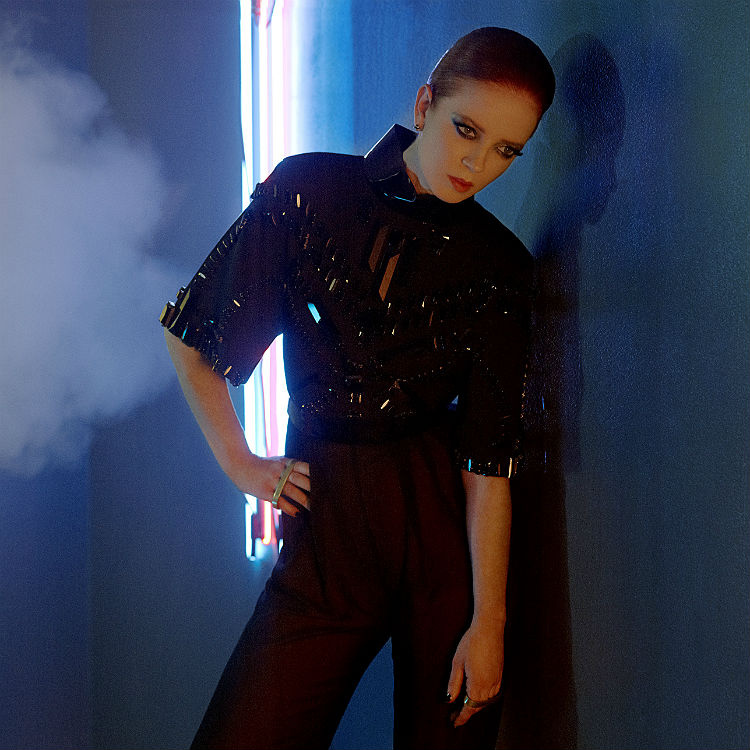 Photo: Press
Photo: Press
"I don't really think about the legacy," shrugs Garbage frontwoman Shirley Manson, looking back on 20 years of the band as they celebrate the anniversary of their seminal self-titled debut. "I've spent my entire career worrying about the last two minutes, so to get to our 20th anniversary is really surreal for me as I've just spent my entire life thinking 'it's over it's over...it's not over...we're still here!'"
With a wide beaming smile spreading, flicking a shock of pink hair from her face as she regularly blurts out a deafening Scottish cackle, the Manson sat before Gigwise in 2015 is still every bit as humbled as she was back then, now sipping coffee in the West London sun as she celebrates Garbage being '20 Years Queer'. "It's been so surprising it's incredible," she nods. "I just want to survive. I've got a real survivor sort of instinct. I just want more life."
And life is all that Garbage return to, again and again - and it all started with one big bang. True, bands back in the 1990s had a little bit more money behind them, while record labels and the world were willing to give them a little more time to find their feet. Fortunately for Garbage, their arrived on the scene with automatic classic.
It was their restless creativity and the hunger of their fans that led them to become an institution - but that immediate rush of fame could well have finished them off nearly two decades ago.
"I didn't enjoy success very much, truth be told," Manson admits. "I felt very uncomfortable, which is ironic because I'm a super attention seeker! I love being loud and noisy, but the minute I did attract so much attention, I was really uncomfortable with it. It made me unhappy, and I didn't like my life being impeded on by cameras. It stopped us all from having that desire to be the biggest band in the world. Be careful what you wish for!"
But it was their shape-shifting and genre-defying ability that allowed Garbage to endure. But with that in mind, and despite the fact that they're here today to celebrate a 20-year-old album, do the Garbage ever get a little bit pissed off when one might refer to them as 'a 90s band'?
"I feel that when people talk about 90s music, they're a little 'uneducated' for want of a better word," says Manson, with a mild frown spreading. "I don't mean that in a horrible snobby way, but I mean that unless you think about how eclectic the 90s were, it's somewhat foolish to try and pinpoint what was the sound of the 90s. What was so glorious about the 90s, and why it's now heyday of music, was because it was so broad.
"Hip-hop was on the radio, pop was on the radio, rock was on the radio, every kind of music that you can possibly think of was on the radio."
She sighs and rolls her eyes. "That was exciting and now we're living in a time when it's pretty much only pop music. No, I don't feel sad when people say that we were part of the 90s - I feel proud because I was happy enough to enjoy that incredible decade of freedom."
That freedom may have been part of the parcel with the more liberal optimism and various explosions and shifts within music in the 1990s, but Garbage were able to do it very much on their own terms because they blazed a trail of their own from the off.
"I feel like a lot of things that we did and were derided for in 1995, have now become part of musical parlance," Manson chuckles. "People were outraged when we first came out and played live, because we used a lot of production, tracks and triggered samples to use a lot of the technology that was available to us at the time. People were appalled and said it wasn't real or authentic, and it wasn't but it was a wave for the future.
"We obsessed with sound and how we approached it and were laughed at for that, but now everyone is obsessed with that. It's competitive now in a way that it wasn't back then."
But all nostalgia aside, Garbage are still here today because of one pure and simple fact: they're a bloody brilliant band. They have their own unique sonic, aesthetic and lyrical language. There's a ruthless and raw honesty that allows them to speak to the fringes of multiple generations by scaling the extremes of every emotion.
With that in mind, how would Garbage fare if they were a new band in 2015, in the dangerous digital age?
"Funnily enough, I think we would have been monstrously successful," beams Manson, that infectious smile and deafening cackle beginning to spread. "If you get success now because of the spread of social media and the internet, you can just globalise immediately. It's terrifying. If you think about the big pop stars of today, they are beyond massive. We would have been even bigger, which is terrifying in some ways. Maybe I'd have had a swimming pool though."
We find it quite hard to believe that Shirley Manson does not own a swimming pool.
"I do not!" she protests. "Contrary to popular belief!"
A pool? Clearly not. A legacy? That's for for you to decide. A band worth celebrating? Hell yes, now and forever - not just on anniversaries.
Check out the rest of Garbage's Gigwise takeover below

Watch Manson talk us through what went in to each and every track on this classic record

Watch Manson discuss how she's 'not so tough' and her deep connection with fans

Manson tells us about her favourite new + classic bands, as well as 'the power' of female artists

On art, honesty, keeping it straight, being authentic and what she really thinks of Kanye

Manson tells all on the band's upcoming, long-awaited and 'romantic' new album


















.jpg)

